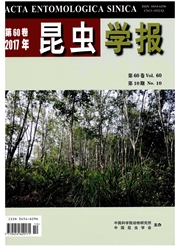

 中文摘要:
中文摘要:
【目的】梨小食心虫Grapholita molesta(Busck)(鳞翅目:卷蛾科)是一种世界性的害虫,能使蔷薇科的果树严重减产。本研究旨在评估此害虫的耐热性及适应性。【方法】将梨小食心虫成虫暴露在不同温度(36,38,40,42,44和46℃)和不同暴露时间(0.5,1,2,4和8 h)下,测定其存活率以及短期高温(38或40℃热驯化1 h)对其热耐受力、寿命、生殖力及卵孵化率的影响。【结果】随着高温暴露时间的延长,梨小食心虫成虫存活率下降。在38或40℃热驯化1 h后,能显著提高梨小食心虫成虫在42℃下2 h的存活率(P〈0.05)。在41℃处理1 h,梨小食心虫出现热休克现象,其寿命显著延长,但产卵量显著下降。进一步的试验证明雄虫受高温影响较大,导致与其配对后的雌虫产卵量降低。然而,不论亲代受到怎样的热刺激,其后代的孵化率均不受影响。【结论】结果说明,超过41℃,1 h的高温能对梨小食心虫带来负面影响,但梨小食心虫成虫有适应高温的潜力。
 英文摘要:
英文摘要:
【Aim】 The oriental fruit moth,Grapholita molesta (Busck) (Lepidoptera: Tortricidae), is a worldwide fruit pest, causing serious loss to fruit productivity. Our study aims to explore the thermal tolerance and adaptability of G. molesta adults after exposure to short-term high temperature. 【Methods】 The survival rate of G. molesta adults exposed to various temperatures (36, 38, 40, 42, 44 and 46℃) for different time durations (0.5, 1, 2, 4 and 8 h), and the effects of shortterm high temperature exposure (heat hardening at 38 or 40℃ for 1 h) on their thermal tolerance, longevity, fecundity, and egg hatchability were investigated. 【Results】 The results showed that the survival rate of G. molesta adults was reduced with the increase of exposure duration to high temperature. The survival rate of G. molesta adults at 42℃ was significantly improved after adults were subjected to heat hardening at 38℃ or 42℃ for 1 h (P〈0.05). After treatment at 41℃ for 1 h, G. molesta adults were heat shocked, with longer life span and less fecundity. The further study confirmed that the male adults were greatly affected by high temperature, resulting in the reduction of eggs laid by female adults paired. Nevertheless, there was no remarkable difference in egg hatchability in different treatments though their parents underwent thermal stress. 【Conclusion】 These results suggest that high temperature exceeding 41℃ for 1 h causes negative effects to G. molesta adults, but G. molesta adults have a relatively high thermal tolerance and the potential to adapt to high temperatures.
 同期刊论文项目
同期刊论文项目
 同项目期刊论文
同项目期刊论文
 期刊信息
期刊信息
